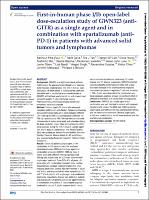| dc.contributor | Vall d'Hebron Barcelona Hospital Campus |
| dc.contributor.author | Piha-Paul, Sarina |
| dc.contributor.author | Geva, Ravit |
| dc.contributor.author | Tan, Tira |
| dc.contributor.author | Lim, Darren Wan-Teck |
| dc.contributor.author | Hierro Carbó, Cinta |
| dc.contributor.author | Doi, Toshikiko |
| dc.date.accessioned | 2022-06-07T12:56:38Z |
| dc.date.available | 2022-06-07T12:56:38Z |
| dc.date.issued | 2021-08 |
| dc.identifier.citation | Piha-Paul SA, Geva R, Tan TJ, Lim DW, Hierro C, Doi T, et al. First-in-human phase I/Ib open-label dose-escalation study of GWN323 (anti-GITR) as a single agent and in combination with spartalizumab (anti-PD-1) in patients with advanced solid tumors and lymphomas. J Immunother Cancer. 2021 Aug;9(8):e002863. |
| dc.identifier.issn | 2051-1426 |
| dc.identifier.uri | https://hdl.handle.net/11351/7635 |
| dc.description | Antibodies; Combination; Neoplasm |
| dc.description.abstract | Background GWN323 is an IgG1 monoclonal antibody (mAb) against the glucocorticoid-induced tumor necrosis factor receptor-related protein. This first-in-human, open-label phase I/Ib study aimed to investigate the safety and tolerability and to identify the recommended doses of GWN323 with/without spartalizumab, an anti-programmed cell death receptor-1 agent, for future studies. Pharmacokinetics, preliminary efficacy and efficacy biomarkers were also assessed.
Methods Patients (aged ≥18 years) with advanced/metastatic solid tumors with Eastern Cooperative Oncology Group performance status of ≤2 were included. GWN323 (10–1500 mg) or GWN323+spartalizumab (GWN323 10–750 mg+spartalizumab 100–300 mg) were administered intravenously at various dose levels and schedules during the dose-escalation phase. Dose-limiting toxicities (DLTs) were assessed during the first 21 days in a single-agent arm and 42 days in a combination arm. Adverse events (AEs) were graded per National Cancer Institute-Common Toxicity Criteria for Adverse Events V.4.03 and efficacy was assessed using Response Evaluation Criteria in Solid Tumors V.1.1.
Results Overall, 92 patients (single-agent, n=39; combination, n=53) were included. The maximum administered doses (MADs) in the single-agent and combination arms were GWN323 1500 mg every 3 weeks (q3w) and GWN323 750 mg+spartalizumab 300 mg q3w, respectively. No DLTs were observed with single-agent treatment. Three DLTs (6%, all grade ≥3) were noted with combination treatment: blood creatine phosphokinase increase, respiratory failure and small intestinal obstruction. Serious AEs were reported in 30.8% and 34.0%, and drug-related AEs were reported in 82.1% and 77.4% of patients with single-agent and combination treatments, respectively. Disease was stable in 7 patients and progressed in 26 patients with single-agent treatment. In combination arm patients, 1 had complete response (endometrial cancer); 3, partial response (rectal cancer, adenocarcinoma of colon and melanoma); 14, stable disease; and 27, disease progression. GWN323 exhibited a pharmacokinetic profile typical of mAbs with a dose-dependent increase in the pharmacokinetic exposure. Inconsistent decreases in regulatory T cells and increases in CD8+ T cells were observed in the combination arm. Gene expression analyses showed no significant effect of GWN323 on interferon-γ or natural killer-cell signatures.
Conclusions GWN323, as a single agent and in combination, was well tolerated in patients with relapsed/refractory solid tumors. The MAD was 1500 mg q3w for single-agent and GWN323 750 mg+spartalizumab 300 mg q3w for combination treatments. Minimal single-agent activity and modest clinical benefit were observed with the spartalizumab combination. |
| dc.language.iso | eng |
| dc.publisher | BMJ |
| dc.relation.ispartofseries | Journal for ImmunoTherapy of Cancer;9(8) |
| dc.rights | Attribution-NonCommercial 4.0 International |
| dc.rights.uri | http://creativecommons.org/licenses/by-nc/4.0/ |
| dc.source | Scientia |
| dc.subject | Càncer - Tractament |
| dc.subject | Quimioteràpia combinada |
| dc.subject.mesh | Antineoplastic Combined Chemotherapy Protocols |
| dc.subject.mesh | Neoplasms |
| dc.subject.mesh | Lymphoma |
| dc.title | First-in-human phase I/Ib open-label dose-escalation study of GWN323 (anti-GITR) as a single agent and in combination with spartalizumab (anti-PD-1) in patients with advanced solid tumors and lymphomas |
| dc.type | info:eu-repo/semantics/article |
| dc.identifier.doi | 10.1136/jitc-2021-002863 |
| dc.subject.decs | protocolos de quimioterapia antineoplásica combinada |
| dc.subject.decs | neoplasias |
| dc.subject.decs | linfoma |
| dc.relation.publishversion | http://dx.doi.org/10.1136/jitc-2021-002863 |
| dc.type.version | info:eu-repo/semantics/publishedVersion |
| dc.audience | Professionals |
| dc.contributor.organismes | Institut Català de la Salut |
| dc.contributor.authoraffiliation | [Piha-Paul SA] Department of Investigational Cancer Therapeutics, University of Texas MD Anderson Cancer Center, Houston, Texas, USA. [Geva R] Division of Oncology, Tel-Aviv Sourasky Medical Center, Tel Aviv University, Tel Aviv, Israel. [Tan TJ] Division of Medical Oncology, National Cancer Centre Singapore, Singapore. Department of Medicine, Division of Medical Oncology and Hematology, Princess Margaret Hospital Cancer Centre, Toronto, Ontario, Canada. [Lim DW] Division of Medical Oncology, National Cancer Centre Singapore, Singapore. [Hierro C] Servei d’Oncologia Mèdica, Vall d’Hebron Hospital Universitari, Barcelona, Spain. Universitat Autònoma de Barcelona, Bellaterra, Spain. Molecular Therapeutics Research Unit, Vall d’Hebron Institute of Oncology (VHIO), Barcelona, Spain. Universitat Autònoma de Barcelona, Bellaterra, Spain. [Doi T] Department of Experimental Therapeutics, National Cancer Center Hospital East, Kashiwa, Japan |
| dc.identifier.pmid | 34389618 |
| dc.rights.accessrights | info:eu-repo/semantics/openAccess |

